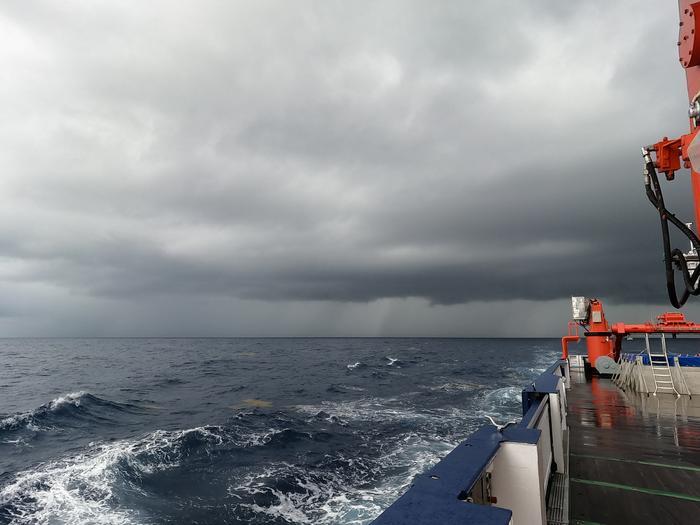Colossal floods in Pakistan, deep summer drought in the northern hemisphere, unusual and prolonged high temperatures in India in April and May, three unusual heat waves in Spain, gigantic hurricanes, the hottest summer in Europe since at least 1880. .. Extreme events, fueled by the climate crisis, are multiplying and science points to the human being.
"Human-induced climate change is already affecting many extreme weather and climate events in all regions," concluded last year in its latest major report by the IPCC, the group of international experts responsible for laying the foundations on the knowledge of this crisis for three decades.
What a few years ago were warnings for tomorrow — warming can make these phenomena more intense and abundant,
“It is not the future;
it is already happening”, summarizes the Chilean Minister of the Environment, Maisa Rojas.
And, as this renowned climate scientist explains, many of these events will have irreversible impacts.
Although the lashes of this crisis are felt throughout the planet, those who suffer the most are the countries with the least resources to deal with the blows.
One month before the start of the UN climate summit (the so-called COP27), which is being held this year in the Egyptian city of Sharm el Sheikh, many developing countries, the presidency of this international conference and the United Nations are struggling to place at the center of the discussion are those impacts and the historical responsibilities of the richest nations on the problem of climate change.
"This is a moral imperative that cannot be ignored and COP27 must be the venue for action on loss and damage," UN Secretary-General António Guterres told a news conference this week.
For years, the expression “loss and damage” has encompassed the claims of nations with fewer resources and which, in many cases, are the ones that suffer and will suffer the most from the impacts of global warming.
"This is going to be a critical issue at the COP," acknowledges Nick Bridge, UK Government Special Representative for Climate Change.
"There are more than 100 countries in the United Nations family that are highly vulnerable, such as small island states or the poorest nations in Africa," adds this diplomat.
"And in the climate change negotiations they've seen a lot of the focus on reducing emissions, on mitigation, but they haven't seen the support and investments to help them adapt and be more resilient."
Nick Bridge, UK special envoy for climate change in Madrid last week.
Alvaro Garcia
Indeed, the focus of the international climate negotiations is fundamentally on mitigation, that is, on the way in which nations cut their greenhouse gases —originated mainly by fossil fuels— so that the already irreversible warming is stay within safety limits.
The planet is about 1.1 degrees Celsius warmer now than it was in the late 19th century, when such fuels began to be used on a large scale.
And the objective that the countries have set in the UN is not to exceed 2 degrees and as far as possible 1.5.
At the moment, the plans of all the nations of the world do not lead in that direction, but rather a warming of around 3 degrees, which will multiply the negative impacts.
The other important, and most neglected, leg of climate diplomacy is adaptation to the impacts of this crisis.
And in this case it is assumed that the richest nations —which are historically responsible for climate change— must help the most vulnerable.
The international commitment was that developed countries mobilize 100,000 million dollars a year for climate financing from 2020. But that promise is not being fulfilled.
According to the latest data provided by the OECD (Organization for Economic Cooperation and Development), in 2020 83.3 billion were “mobilised”.
In addition to falling short of promise, most of the funds that went from the public and private sectors to developing countries in 2020 came in the form of loans;
only 21% of the money was subsidies.
And only 34% of the funds went to adaptation actions to make nations with fewer resources more resilient to climate change.
The bulk of the 83.3 billion dollars goes to mitigation actions, such as the installation of renewables.
The Egyptian Wael Aboulmagd, special representative of the presidency of the COP27, recalled in a press conference that the Paris Agreement "imposes on developed countries the responsibility to help developing countries with adequate financing to make the transition to a more sustainable economy.
Aboulmagd urged richer nations to meet the $100 billion a year target and double funding for adaptation, as agreed at the Glasgow climate summit a year ago.
new mechanism
But what is proposed is to go one step further: the most vulnerable countries ask for the establishment of a new mechanism —with their own resources— for loss and damage to deal with the catastrophes already generated by global warming, something that even now the richest nations have resisted.
Although there is a consensus on the "historical responsibilities" of developed countries, this issue generates "significant tension" in the negotiations on climate change, explains Minister Maisa Rojas.
"It's a very emotional issue," she adds, because some small states, such as several Pacific islands, are directly risking their survival in the face of rising sea levels.
In other cases, adds the Chilean minister, the extreme events linked to climate change and their high costs "put at risk that some countries may come out of underdevelopment."
A recent Oxfam Intermón report warned that "extreme hunger has more than doubled in the 10 countries most affected" by natural disasters linked to climate change.
The NGO identified 10 critical points on the planet: Somalia, Haiti, Djibouti, Kenya, Niger, Afghanistan, Guatemala, Madagascar, Burkina Faso and Zimbabwe, the nations in which the UN has had to make the most emergency appeals due to extreme phenomena in the last six years.
The Egyptian presidency of COP27 has appointed Minister Rojas and the German government's special envoy for climate action, the well-known environmentalist Jennifer Morgan, as the facilitators for the loss and damage chapter.
Her job is to listen to all the existing positions and try to put on track an agreement of the almost 200 countries that participate in these international negotiations.
This week the representatives of around 60 of these countries have met in Kinshasa to prepare for COP27 and, according to Rojas, it has become clear that the countries will fully enter into the discussions of the Sharm el Sheikh loss and damage chapter.
Although the Chilean minister admits that it is difficult to guess if some kind of agreement will be reached on this future loss and damage mechanism.
Because, as Guterres warned this week, "while climate chaos gallops forward, climate action has stalled."
The secretary general has insisted that the issue of loss and damage must be "central" in the discussions at COP27: "we know that people and nations are suffering now".
Therefore, “significant decisions are required now”.
The risk is that "failure to act on loss and damage" will lead "to further loss of confidence and more climate damage."
You can follow CLIMA Y MEDIO AMBIENTE on
and
, or sign up here to receive
our weekly newsletter
Subscribe to continue reading
read without limits
Keep reading
I'm already a subscriber





/cloudfront-eu-central-1.images.arcpublishing.com/prisa/DOOQ2YEAZJCSNITR6TA2ARDQT4.jpg)
/cloudfront-eu-central-1.images.arcpublishing.com/prisa/ARR2O7RSB5GA3PHABH4GHEX5FY.jpg)


